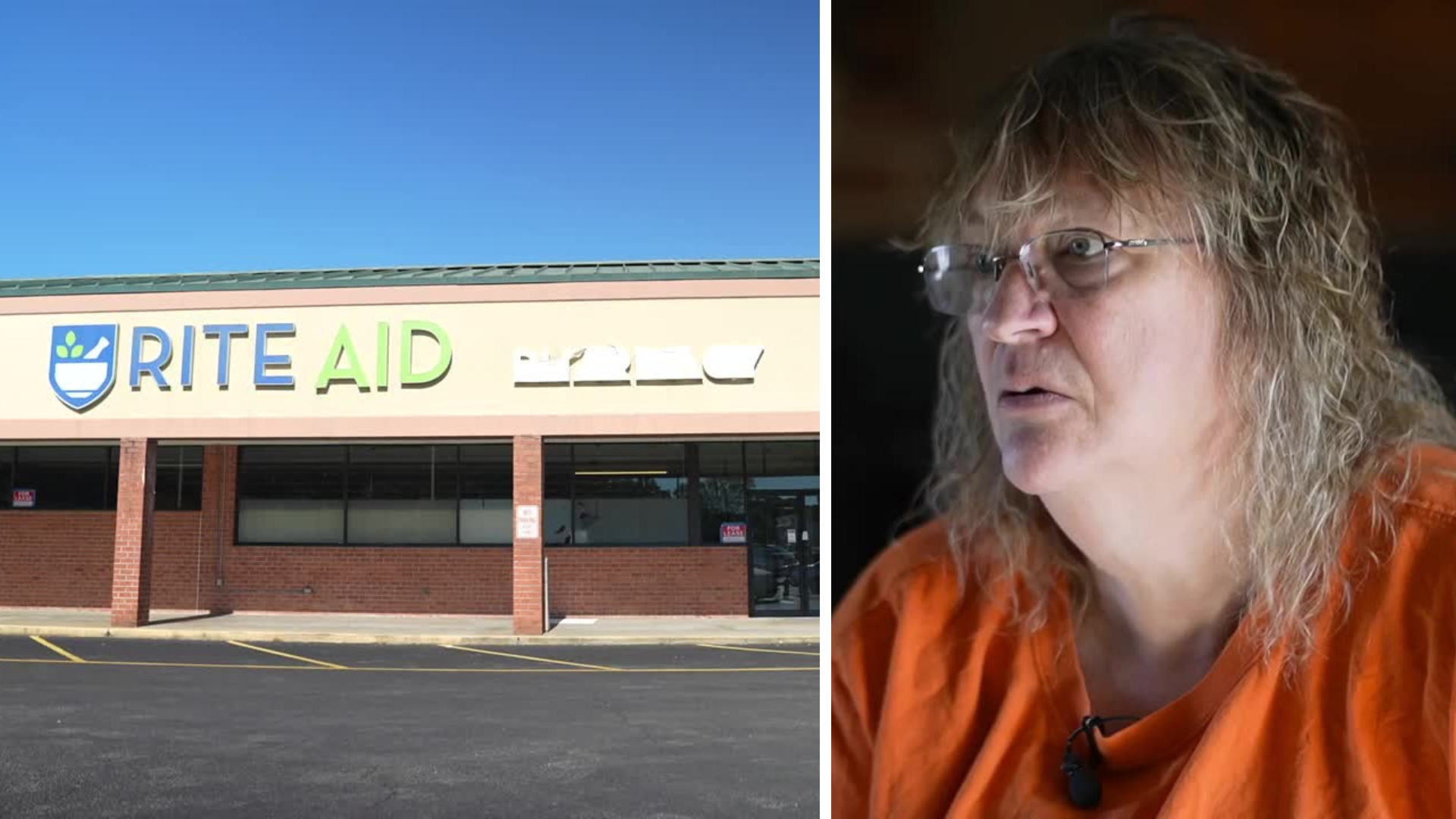BRUNSWICK COUNTY, Va. — Sarah Abernathy enjoys the serenity of living on 32 acres of land in rural Brunswick County, but she admits there is a downside.
"You got a bunch of land, you got a farm, you got the cows, but what you don't have—," reporter Tyler Layne said.
"Is a pharmacy," Abernathy answered.

And that presents a challenge when she and her husband have a combined 11 prescriptions that need to be regularly filled. They make trips to the drug store weekly or every other week, she said.
For years, they had relied on the Rite Aid in Lawrenceville for pharmacy services, which was a 12-minute drive from their house.
But in June, amid the company's bankruptcy proceedings, the store closed its doors, leaving no remaining pharmacies countywide.

“Rite Aid shut down, and we have nothing," Abernathy said. “I was angry because we were left with—it's a 30-minute drive to South Hill or a 30-minute drive to Emporia.”
Abernathy said it's "extremely frustrating" having to travel so far to the closest pharmacy, but she's even more concerned for elderly residents who face transportation issues.
While mail order options are available, Abernathy believes that doesn't compare to a traditional pharmacy.
“When I'd walk into Rite Aid, they knew me, and they would have my prescriptions ready for me, and the whole knowing what can be taken with what," Abernathy said.
“So you're saying those face to face interactions with the pharmacist in person—," Layne said.
“Highly recommend. Highly recommend. I just can't see ordering my prescriptions online," Abernathy responded.
Abernathy isn't alone in her concerns.
In October, the State Board of Health declared pharmacy deserts a public health threat in Virginia, pointing to a net loss of 32 pharmacies in 2025 so far.
The board noted the closures, consisting of chain and independent stores, are "decreasing the ability of the citizens, especially the underserved and those with chronic conditions, to access their needed medications, immunizations, and other pharmacy services as well as negatively impacting local economies."
In Southside Virginia, represented by Republican Delegate Otto Wachsmann, the threat is even more apparent.
“There are three entire counties without a single pharmacy license in those counties," Wachsmann said, specifically referring to Brunswick, Greensville, and Southampton counties.

“What does that signal to you?” Layne asked.
“Something’s wrong, because where do they get the medication?” Wachsmann said.
He said the issue should be treated as a public health crisis as many pharmacy owners he knows are operating at unsustainable margins.
In a recent CBS 6 report, Wachsmann and the owners of the Goochland Pharmacy said the root of the problem lies with pharmacy benefit managers (PBMs).
A PBM is essentially a middleman that works with insurance companies to negotiate drug prices with manufacturers and then reimburses pharmacies for dispensing medications.
But some pharmacists say PBMs oftentimes do not reimburse pharmacies enough to fully cover their costs, making it especially difficult for pharmacies to survive. The Virginia Pharmacy Association describes PBMs as "profit-focused middlemen" that "effectively starve local pharmacies."
In some cases, an insurance company, PBM, and pharmacy are all owned by the same parent company. Regulators and state attorneys general have raised concerns about the impacts of vertical integration and PBMs steering patients to their affiliated pharmacies.
However, the PBM industry rejects claims that they contribute to rising drug costs and squeeze locally owned pharmacies out of business. The Pharmaceutical Care Management Association, which represents PBMs, argues PBMs reimburse independent pharmacies at higher rates than pharmacies they're affiliated with and that concerns about drug costs should be redirected toward drug manufacturers.
In September, the Board of Health and State Health Commissioner sent a letter to Governor Youngkin's administration asking it to prevent the development of pharmacy deserts in Virginia, address root problems, and promote access to pharmacy services.
Abernathy agrees those issues should be a top priority for state leaders.
"It's dire, she said. “We need pharmacies. We need to be paid attention to, and you can't just ignore us."
CBS 6 is committed to sharing community voices on this important topic. Email your thoughts to the CBS 6 Newsroom.
📲: CONNECT WITH US
Blue Sky | Facebook | Instagram | X | Threads | TikTok | YouTube






